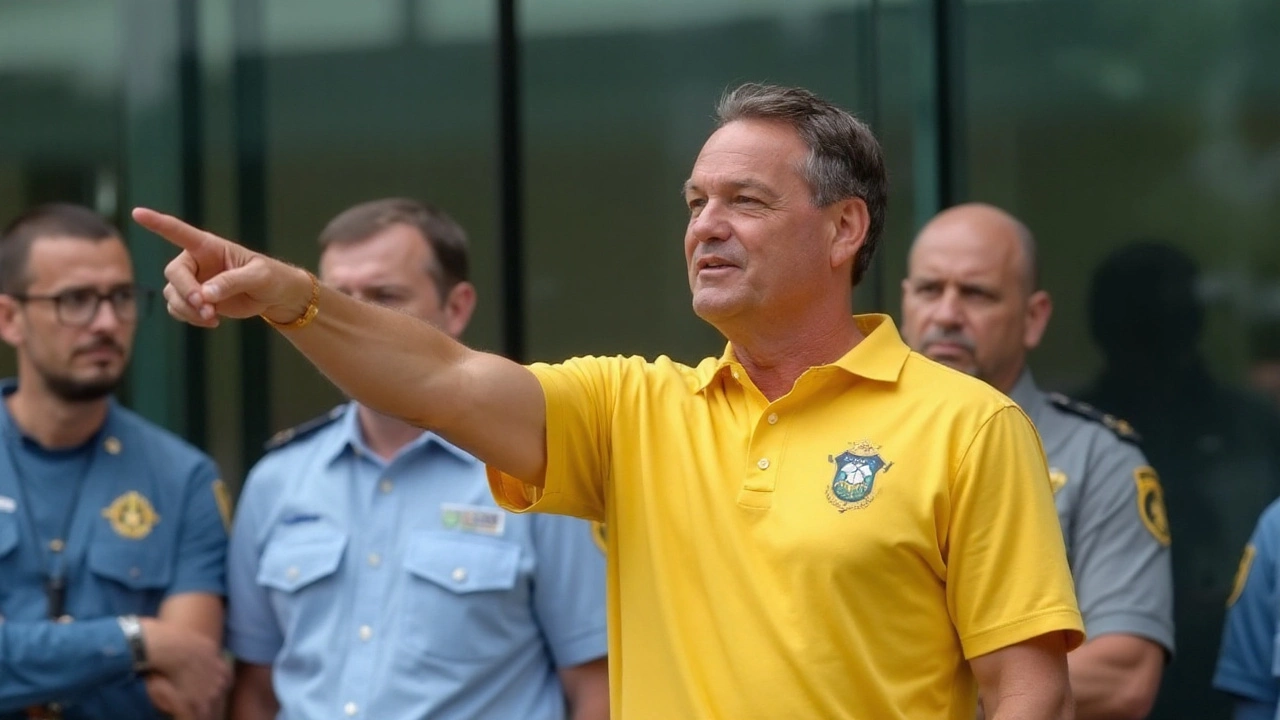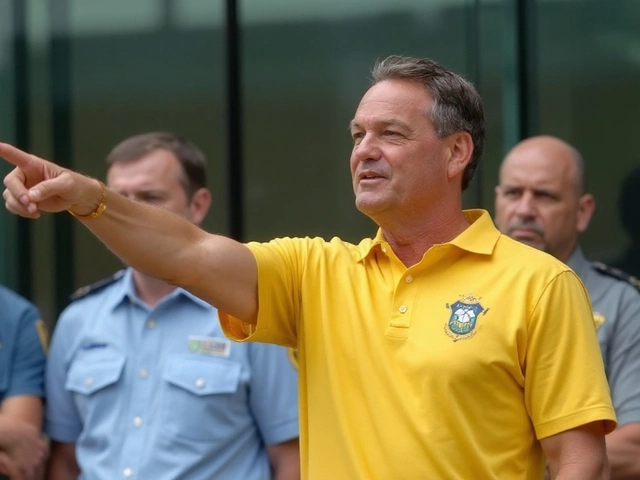- Home
- World News
- Brazil Police Say Bolsonaro Drafted Asylum Plea to Argentina, Citing Flight Risk Ahead of Coup Ruling

Brazil Police Say Bolsonaro Drafted Asylum Plea to Argentina, Citing Flight Risk Ahead of Coup Ruling
A draft plea for asylum, a looming verdict, and a fight over trust in the courts
A 33-page document found on a mobile phone has pushed Brazil’s most divisive political figure back into the spotlight. Federal Police said they recovered a draft letter in February 2024 in which Bolsonaro asked Argentina’s President Javier Milei for political asylum, arguing he was a victim of persecution at home. Investigators filed the find to the Supreme Federal Court as proof that the former president might try to flee.
Supreme Court Justice Alexandre de Moraes accepted the filing and, in a resolution made public this week, ordered Bolsonaro’s legal team to respond within 48 hours. The timing is no small detail. Between September 2 and 12, the Supreme Court is set to issue a crucial ruling on whether Bolsonaro tried to overturn the 2022 election after losing to Luiz Inácio Lula da Silva. If a conviction follows, the possible prison time could stretch up to four decades under combined charges, according to case summaries circulating in Brasília.
The draft asylum request—dated just after police opened a formal coup-plotting probe in February—reads like a pre-emptive bid to get out ahead of the justice system. It reportedly frames the former leader as a target of political bias rather than a defendant in criminal cases. For investigators, that is exactly the problem: they say it shows intent to evade the courts. Justice de Moraes has made flight risk a central part of recent rulings tied to the investigations stemming from the tumult around the 2022 vote and the January 8, 2023 rampage at Brazil’s government complex.
Bolsonaro has denied criminal intent in multiple probes and says he is the target of political revenge. His team did not immediately comment on the asylum draft filing. Police, for their part, are treating the document as one more piece in a larger puzzle that includes suspected attempts to discredit the electoral system, pressure institutions, and mobilize allies in and out of government.
Argentina’s role adds a layer of geopolitics. President Milei, who is ideologically aligned with Bolsonaro, took office in December 2023 and has pitched himself as a fierce small-government reformer. Bolsonaro traveled to Buenos Aires for Milei’s inauguration and has publicly praised him. Whether that personal rapport would have translated into an asylum offer is an open question—one that Buenos Aires would have to weigh against bilateral ties and legal commitments with Brazil.
In Brazil’s filing, police argue the draft letter shows deliberate planning rather than idle talk. The document surfaced during searches tied to the broader coup-plotting case, according to officials familiar with the operation. While the court filing does not suggest that Bolsonaro actually sent the letter to the Casa Rosada, the mere existence of a formal draft is being used to justify tighter scrutiny and, if necessary, more restrictions.
The court has already leaned on restrictive measures in recent months. Bolsonaro’s passport was seized early this year during searches connected to the investigation, limiting his ability to travel. The step mirrored other cases arising from the post-election unrest, where suspects have been ordered to surrender travel documents, avoid contact with co-defendants, and observe social media limits while proceedings are underway.
The coup case remains the centerpiece. Investigators are testing whether Bolsonaro and his inner circle worked to stop Lula’s inauguration after the 2022 runoff. Lines of inquiry have focused on public speeches attacking Brazil’s voting machines, private meetings with military and police figures, and a persistent narrative aimed at undermining the electoral court. Separate probes track alleged pressure on officials, suspected interference with federal police, and the stream of online content that fueled the January 8 rampage.
Even outside the Supreme Court case, the former president faces a thicket of legal trouble. Brazil’s electoral court (TSE) already declared him ineligible to run for office until the end of the decade after it found he abused his office by spreading falsehoods about the voting system in a high-profile 2022 meeting with foreign diplomats. Other investigations examine the handling of official gifts, the alleged manipulation of COVID vaccination records, and possible irregularities in the use of the presidential apparatus during the campaign.
What exactly would an asylum request to Argentina mean? In simple terms, asylum is a claim that a person faces persecution for political reasons and needs protection in another country. Argentina has procedures for refugee and asylum claims, and the government can also face diplomatic pressure in high-profile cases. Extradition agreements between the two countries would come into play if Brazilian courts issued arrest warrants or if the process matured into a conviction. Most extradition deals carve out exceptions for “political offenses,” but courts usually decide where that line is drawn.
Milei’s administration would also have to balance law and politics. Granting asylum to a former Brazilian president under active investigation could strain relations with Brasília. Lula and Milei have had a chilly start, clashing over trade policy and regional diplomacy. An asylum case at this level would force both governments to choose between domestic political instincts and the practical need to keep Mercosur’s two largest economies cooperating on security and commerce.
Police say the draft letter surfaced just days after they formally opened the coup-plotting probe in February 2024, and they emphasize that it was stored on Bolsonaro’s personal device. For prosecutors, chain-of-custody matters. A document found directly on a defendant’s phone is usually easier to authenticate than something passed along through intermediaries. Defense lawyers often attack such evidence by challenging context and intent: Was the draft a legal hypothetical? Who wrote it? Was it ever meant to be sent?
Expect those questions to dominate the 48-hour response window granted by Justice de Moraes. Bolsonaro’s team could argue that drafting a legal request is not a crime and that political asylum is a recognized international protection, not an admission of guilt. Prosecutors, meanwhile, will point to the totality of the record—public statements, private messages, and moves by allies—to argue that the draft fits a pattern.
The circle around Bolsonaro is also feeling the heat. Federal Police recommended charges against Congressman Eduardo Bolsonaro, alleging he tried to pressure the judiciary. Eduardo has spent months courting conservative allies in the United States and urging them to support his father’s narrative about the 2022 race. Brazilian authorities say those efforts cross over into intimidation when they’re aimed at swaying ongoing court cases.
None of this is happening in a vacuum. Brazil’s Supreme Court has turned into the central arena for conflicts over democracy, disinformation, and accountability. Justice de Moraes, in particular, has become the face of a hard line against what he calls digital militias and attempts to sabotage institutions. Supporters see him as defending the rule of law. Critics say he’s gone too far and chilled political speech. That split runs through Brazilian society and will color reactions to the asylum draft.
Here’s how the next stretch could unfold:
- The defense files its response to the Supreme Court, challenging the idea that the draft letter proves intent to flee.
- The court weighs whether to impose new restrictions, keep current measures, or move directly toward a ruling in the coup case window announced for early to mid-September.
- If the court convicts, sentencing will follow, and appeal options will be mapped out. Any extradition or asylum scenario would depend on whether there is a final judgment and what charges stick.
- Argentina stays quiet or signals its stance. Without a formal asylum request actually submitted, Buenos Aires may avoid comment. If a request arrives, the legal process would start there—likely with intense public scrutiny.
There’s also the practical question of what “flight risk” looks like for a figure this prominent. Close monitoring is easier said than done. Borders in the Southern Cone are porous in parts, and recent history shows that high-profile defendants can move quickly if they choose. On the other hand, every step taken by Bolsonaro is followed by media and political opponents, making a stealth escape difficult.
For now, everything circles back to the Supreme Court’s coming decision. The coup case will either validate prosecutors’ theory that the former president tried to subvert the transfer of power or undercut it. The draft asylum letter doesn’t decide that question, but it reshapes the stakes. If the court reads it as a plan to bolt, expect tougher conditions. If the defense can cast it as a legal brainstorm that never left a drafts folder, the court might stick to the current guardrails.
Brazil has been here before, though not at this scale. The country’s recent past is dotted with legal showdowns that scrambled politics and defined legacies. This one overlaps rule-of-law tests at home with diplomatic dilemmas next door. A 33-page text, discovered at the very moment the legal vise was tightening, has made the road to September steeper—and made Argentina part of the story whether it wants to be or not.
What asylum would test: law, politics, and a strained neighborhood
Asylum cases are rarely neat. They force countries to judge whether a prosecution is legitimate or political. Brazil says it is pursuing specific crimes related to the 2022 election and the January 8 riot, not silencing dissent. Bolsonaro says the cases are an attempt to erase his movement. If he had filed the asylum request, Argentina would be stuck in the middle, weighing statutes against geopolitics.
Under typical practice, Argentina’s refugee and asylum system would examine whether the claim meets the threshold of political persecution. Extradition matters would go to the courts, with political offense exceptions in play. The executive branch could face pressure either way—from supporters of Milei who see Bolsonaro as a fellow traveler, and from institutionalists worried about undermining rule-of-law norms in the region.
Brazilian prosecutors, meanwhile, want to ensure that the clock does not run out on major cases. The Supreme Court’s schedule suggests they are moving to a decisive phase. If the justices deliver a split or narrow ruling, other investigations will still grind on. If they deliver a sweeping conviction, the dynamic changes overnight, and the relevance of any asylum scenario increases.
Two takeaways stand out. First, the discovery of a ready-to-send draft is unusual in a case like this and will weigh heavily in risk assessments. Second, even if it never left a phone, the letter tells a story: someone close to the center of power anticipated the need for protection abroad just as authorities turned up the heat. Whether that story matches the legal reality is what the Supreme Court now has to decide.

Dexter Fairborn
Hi, I'm Dexter Fairborn, a professional gambler and gaming enthusiast. I've been involved in the world of gambling and gaming for over a decade, constantly refining my skills and strategies. Apart from playing, I also enjoy writing about various games, sharing my experiences, tips, and tricks with fellow gamers. My passion for gaming has led me to create engaging content that can help others improve their gameplay and enjoy the thrill of the game. Join me as we explore the fascinating world of gambling and gaming together.
About
Welcome to Lightning Bonus Casino, your ultimate destination for thrilling gambling and gaming experiences. Explore our extensive collection of top-notch games and stay updated with the latest industry trends. Get ready to electrify your online gaming journey with our exclusive bonuses and promotions!

